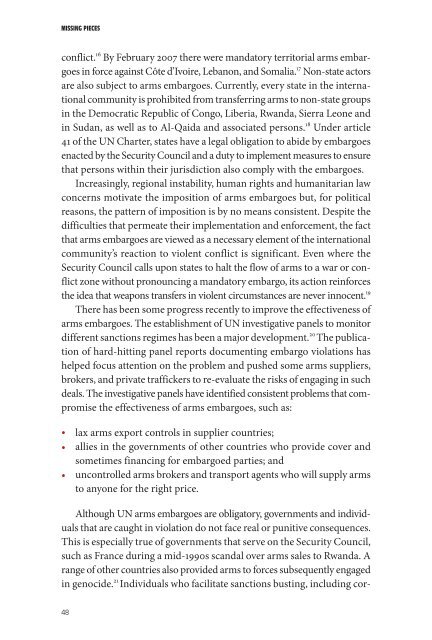MISSING PIECES - Inter-Parliamentary Union
MISSING PIECES - Inter-Parliamentary Union
MISSING PIECES - Inter-Parliamentary Union
Create successful ePaper yourself
Turn your PDF publications into a flip-book with our unique Google optimized e-Paper software.
<strong>MISSING</strong> <strong>PIECES</strong><br />
conflict. 16 By February 2007 there were mandatory territorial arms embargoes<br />
in force against Côte d’Ivoire, Lebanon, and Somalia. 17 Non-state actors<br />
are also subject to arms embargoes. Currently, every state in the international<br />
community is prohibited from transferring arms to non-state groups<br />
in the Democratic Republic of Congo, Liberia, Rwanda, Sierra Leone and<br />
in Sudan, as well as to Al-Qaida and associated persons. 18 Under article<br />
41 of the UN Charter, states have a legal obligation to abide by embargoes<br />
enacted by the Security Council and a duty to implement measures to ensure<br />
that persons within their jurisdiction also comply with the embargoes.<br />
Increasingly, regional instability, human rights and humanitarian law<br />
concerns motivate the imposition of arms embargoes but, for political<br />
reasons, the pattern of imposition is by no means consistent. Despite the<br />
difficulties that permeate their implementation and enforcement, the fact<br />
that arms embargoes are viewed as a necessary element of the international<br />
community’s reaction to violent conflict is significant. Even where the<br />
Security Council calls upon states to halt the flow of arms to a war or conflict<br />
zone without pronouncing a mandatory embargo, its action reinforces<br />
the idea that weapons transfers in violent circumstances are never innocent. 19<br />
There has been some progress recently to improve the effectiveness of<br />
arms embargoes. The establishment of UN investigative panels to monitor<br />
different sanctions regimes has been a major development. 20 The publication<br />
of hard-hitting panel reports documenting embargo violations has<br />
helped focus attention on the problem and pushed some arms suppliers,<br />
brokers, and private traffickers to re-evaluate the risks of engaging in such<br />
deals. The investigative panels have identified consistent problems that compromise<br />
the effectiveness of arms embargoes, such as:<br />
• lax arms export controls in supplier countries;<br />
• allies in the governments of other countries who provide cover and<br />
sometimes financing for embargoed parties; and<br />
• uncontrolled arms brokers and transport agents who will supply arms<br />
to anyone for the right price.<br />
Although UN arms embargoes are obligatory, governments and individuals<br />
that are caught in violation do not face real or punitive consequences.<br />
This is especially true of governments that serve on the Security Council,<br />
such as France during a mid-1990s scandal over arms sales to Rwanda. A<br />
range of other countries also provided arms to forces subsequently engaged<br />
in genocide. 21 Individuals who facilitate sanctions busting, including cor-<br />
48
















